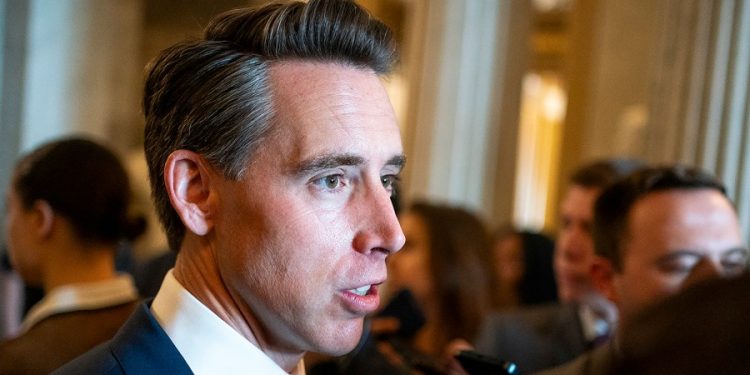Sen. Josh Hawley (R-Mo.) is staking out his spot as a populist defender of Medicaid in opposition to the steep cuts contained in the House-passed megabill to fund President Trump’s domestic agenda.
The senior senator from Missouri — who as the state’s attorney general once signed on to a lawsuit seeking to overturn the Affordable Care Act — has made his position clear: He will not support a bill that cuts Medicaid benefits.
Hawley has long warned his party against Medicaid cuts; the $800 billion question is whether other senators will join him.
He joined with Sen. Ron Wyden (D-Ore.) during a marathon series of votes on the budget resolution in April to introduce an amendment that would have stripped the House’s directive to find $880 billion in savings. The amendment was not adopted, but Sens. Susan Collins (R-Maine) and Lisa Murkowski (R-Alaska) also voted for it.
Earlier this month, Hawley wrote in a New York Times op-ed that slashing health care for the working poor “is both morally wrong and politically suicidal.”
“Republicans need to open their eyes: Our voters support social insurance programs,” Hawley wrote. “More than that, our voters depend on those programs.”
Hawley is adamant that Republicans take President Trump seriously when he says they should not touch Medicaid benefits and instead focus on “waste, fraud and abuse.”
“We ought to just do what the president says,” Hawley said late last week, after the House passed its version of the bill.
He cited concerns about the impact the House bill’s Medicaid provisions — most notably a freeze on provider taxes — would have on rural hospitals.
Missouri health experts said about 10 rural hospitals closed in the years leading up to the expansion vote. Ever since, there haven’t been any closures.
Hawley also said he spoke with Trump, who reiterated his desire for Congress not to cut Medicaid benefits.
“His exact words were ‘don’t touch it, Josh.’ I said hey, we’re on the same page,” Hawley told reporters.
In a CNN interview earlier this month, Hawley called a provision requiring increased beneficiary co-pays “basically a hidden tax on working poor people who are trying to get healthcare.”
Outside observers said Hawley hasn’t suddenly become a defender of ObamaCare, but his Medicaid position reflects the changing politics of the low-income health care program. Lower-income, working-class people on Medicaid are now a major part of the GOP base, which has become more populist since the emergence of Trump.
Missouri is a ruby-red state that Trump won handily in 2024, but those voters also overwhelmingly passed a ballot measure in 2020 to expand Medicaid.
“All the research shows that there are more people in rural areas on Medicaid than in urban areas. And I think [Hawley’s] picked up on that. … These are his voters, and he seems to be speaking out of a populist position,” said Timothy McBride, a health economist and professor at Washington University’s School of Public Health.
The legislation that passed the House late last week would cut nearly $800 billion from Medicaid through a combination of provisions that include work requirements on “able-bodied adults” through age 64 without dependents, a freeze on provider taxes, more frequent checks of people’s eligibility, and reducing federal Medicaid payments to states that provide health care coverage for migrants without legal status.
Congressional scorekeepers estimated the bill would result in close to 10 million people losing insurance coverage.
The legislation doesn’t make specific changes to the federal matching rate for Medicaid expansion, as hard-liners pushed for, but it is still designed to penalize expansion states.
There are 1.3 million people receiving Medicaid benefits in Missouri, including 350,000 people covered by Medicaid expansion.
Leighton Ku, a professor and director of the Center for Health Policy Research at George Washington University’s Milken Institute School of Public Health, estimated the state would lose about $2.4 billion in federal funding over a decade.
Unless the state repeals its expansion, which can’t be done without another ballot measure, Missouri will need to find some other way to pay for that coverage.
“So that’s going to create hardship for Missouri, because … Missouri is otherwise a pretty red state, so they don’t like doing things like raising taxes,” Ku said, meaning they’d likely have to cut other benefits. “This is one of the things that is causing Senator Hawley some concerns.”
But experts and advocates said they remain perplexed by Hawley’s support for work requirements.
Hawley and other GOP lawmakers argue the work requirements do not qualify as a cut to benefits. They say work requirements will make the “able-bodied” individuals who choose not to work contribute to society.
But experts say almost all beneficiaries are already working.
“The people who are typically affected [by work requirements] are not young guys playing Xbox. It tends to be middle-aged and older women,” said Ku. “Paperwork gets in the way.”
The nonpartisan Congressional Budget Office estimated that the work requirements would save the federal government $280 billion over six years, at the cost of millions of people losing insurance.
“I think that it’s great that he is sticking up for Medicaid, that he’s voicing concerns that are important to his constituents,” Christi Lero, a Medicaid ambassador for the left-leaning Missouri Rural Crisis Center, said. “But what’s also important is the method to go about protecting Medicaid. These job requirements are really just a different avenue to cut Medicaid. And we know that.”
But as in the House, there are competing factions in the Senate calling for even steeper cuts to Medicaid. It’s not clear how leadership will try to satisfy all camps. The House’s legislation front-loads much of the savings to satisfy the conservatives.
Scaling back Medicaid cuts would also upset the delicate balance that got the bill across the finish line in the House. Conservatives are already warning that they won’t swallow an erosion of their hard-fought, deficit-cutting victories.
Al Weaver contributed to this story.















